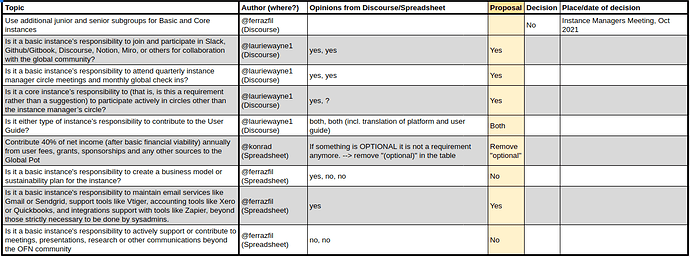About this post: this is assembled input and wisdom from @Jen, @Rachel, @lin_d_hop, @berniemabbs, @konrad , and @lauriewayne1 . We propose to gather input over 4 weeks from the discourse community, make any changes, and enact this process starting at the next instance managers meeting in October 2021.
The global team, which creates and cares for the commons (code, assets, and knowledge) has only limited resources available (time and money) to provide support to instances worldwide.
The idea of a core instance does not reflect how important or legitimate it is, so instead of referring to a “level;” we are referring to a “position” to describe how the activities of instances are integrated with the global team - core instances are closer and more aligned, and other instances tend to be more independent and self sufficient while still being part of the community.
This post is an attempt to:
- Document community agreements regarding the rights and responsibilities of instances with different positions (core or basic) in the OFN community.
- Propose a process, including minimum requirements, by which an instance’s position (core or basic) is accepted and formalized.
- Propose a process for the community to review an instance’s position on a regular basis.
Rights and responsibilities in the OFN community
We have made a quick overview of instance rights and responsibilities based on the instance’s position in the community - spreadsheet link . An image of the chart is copied below.
We would like input from the community as to any item that should be in the chart but is not, or is on the chart and should not be, as well as what type of instance the item applies to.
The blue cells where there are question marks indicate that we have the following questions:
- Is it a basic instance’s responsibility to (that is, is this a requirement rather than a suggestion):
- Join and participate in Slack, Github/Gitbook, Discourse, Notion, Miro, or others for collaboration with the global community?
- Attend quarterly instance manager circle meetings and monthly global check ins?
- Is it a core instance’s responsibility to (that is, is this a requirement rather than a suggestion) to participate actively in circles other than the instance manager’s circle? If so, which one(s)?
- Is it either type of instance’s responsibility to contribute to the User Guide? If so, how is that measured?
Proposal: Process by which an instance’s position (core or basic) is accepted and formalized
An instance’s position will be agreed upon in the instance managers circle quarterly meeting.
- Instances willing to become a core instance can ask for approval by announcing it in the #instance-managers Slack channel and adding the request to the agenda of the instance managers circle quarterly meeting (both of these at least a week before the meeting).
- In the meeting, the instance’s request is reviewed, and any clarifications or questions that have been added to the agenda or voiced in the meeting are addressed
- If a consent agreement with no objections is achieved, the decision is considered to be made and is documented in the notes for the instance managers circle meeting.
Proposal: Process for each instance’s position (core or basic) status review
The instance managers circle is responsible for deciding the instance’s position of each instance. This means:
- Before each instance managers quarterly meeting, instances confirm that they are fulfilling their responsibilities and receiving services from the community that they are entitled to.
- If this is not the case, this concern should be brought into the agenda for the instance managers circle meeting, and the circle will decide on the appropriate action, which may include checking in, offering support or downgrading an instance’s position.
References:
- Core/Non-core Instances and Sysadmin Support - Governance
- https://community.openfoodnetwork.org/t/how-do-we-balance-specific-user-needs-that-can-be-funded-by-specific-parties-to-the-global-priorities-which-are-funded-from-the-global-pot/1727
- Global instance self-guided launchpad (2020)
- Onboarding Instances (2021)
- Global instance launchpad (2019)

